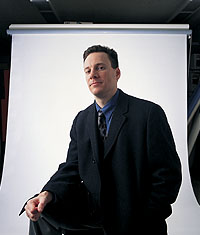

1. Use electronic balloting systems.
"Given the number of undervotes and overvotes in Florida, we may never know who really won the election. There are some counties in Colorado and Texas which use an electronic ballot system that is like an ATM. You make your choice just as you would withdraw money from an ATM. The machine prevents voting for more than one candidate and, before you are through, it confirms your choices. It minimizes the possibility of making a mistake.
"In Florida we had 2 to 3 percent of the population registering no preference for president. In those counties in Texas and Colorado that used the electronic ballot system, the non-voting rate for president was 0.1 percent or 0.2 percent, really low. There is no question that the non-voting rate is much higher under a punch card system.
"I wouldn't recommend voting over the Internet, however. It is too vulnerable to hacking. These electronic ballot machines are not networked. Each one serves as a stand-alone unit, so they are more secure."
2. Launch public financing of campaigns.
"We need to have public financing for campaigns as is being done or planned in four states. Those states are Vermont, Maine, Massachusetts and Arizona. All of them were passed by voter initiatives except for Vermont. They are just beginning and we ought to watch this. It would relieve the candidate of the pressures of raising money from private sources and free the candidate up to devote more time to the issues. It would eliminate real or perceived conflicts of interest—buying the votes—and that could help restore legitimacy for our political system."
3. Lengthen the time between primaries and the general election.
"I'm talking about the general election of legislators, state officials, representatives and senators in Congress. In our state we hold the primary in September, that's only two months away from the general election. If you run in a contested primary, you may not have any money left over for the general election. The system we currently have tends to favor incumbents. We'd be better off having our state primary in June."
4. Create regional primaries for presidential elections.
"We have to rationalize our primary system. New Hampshire goes first only because of tradition. We need to have a rotating, regional primary system. Over the span of four elections, each region would have a chance to go first. You could have the South go first in 2004 and then the Midwest go first in 2008."
5. Emphasize the issues instead of the horse race.
"It's sad. On your local news station, more time is devoted to the candidates during the commercial breaks than is spent during the news segment. When you do get coverage locally or nationally, reporters cover the horse race aspects—who's ahead and who's behind—rather than the issues.
"We need to put pressure on journalists to cover substantive issues, but how? The Federal Communications Act says broadcasters have to do programs in the public interest. We need more pressure brought to bear by the general public to pay more attention to the issues."
What the future holds:
"Whenever you make a prediction about the future, the best guess is to select the way we do things now. Any change is difficult in our political system of checks and balances. There are lots of blocking points, especially when it comes to rules about changing elections. After all, that's a politician's bread and butter. If I had to make a prediction, I'd say there will be very little change in our electoral system."
|
Mark Smith is an assistant professor of political science who has been teaching at the UW for four years. His courses include Introduction to American Politics, American Interest Groups, the U.S. Congress, and Public Opinion. A graduate of MIT and the University of Minnesota, Smith published his first book, American Business and Political Power, in September.